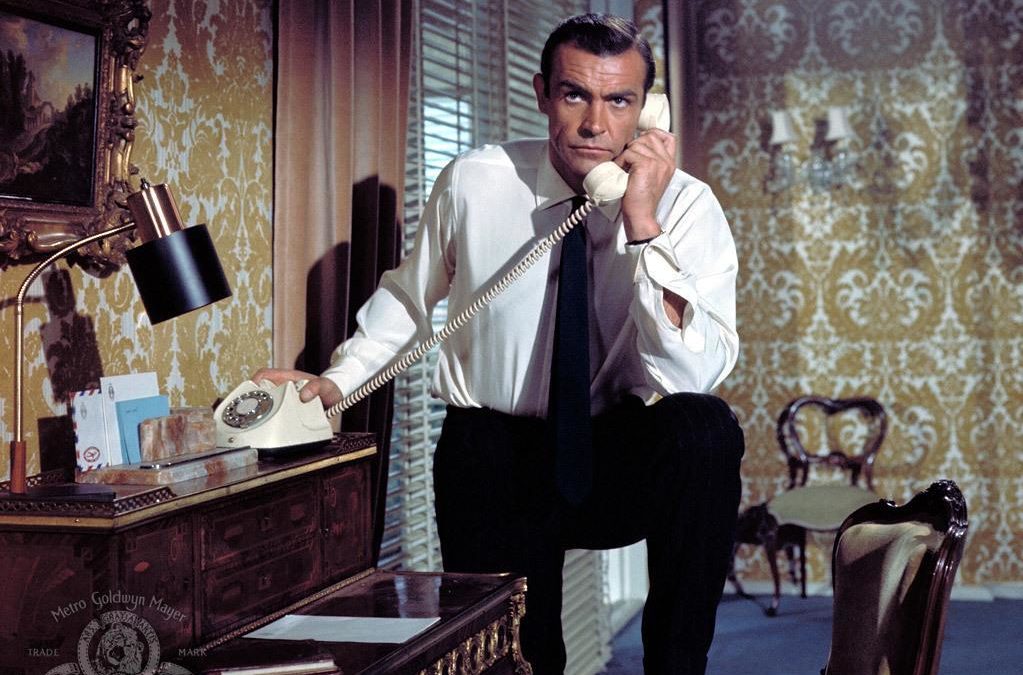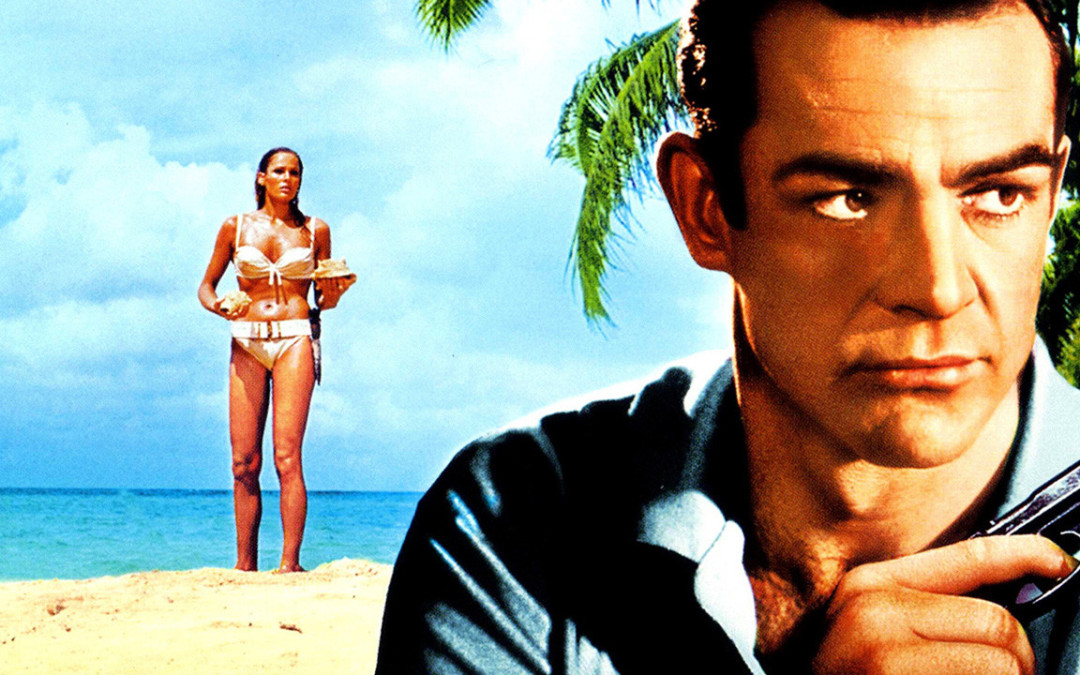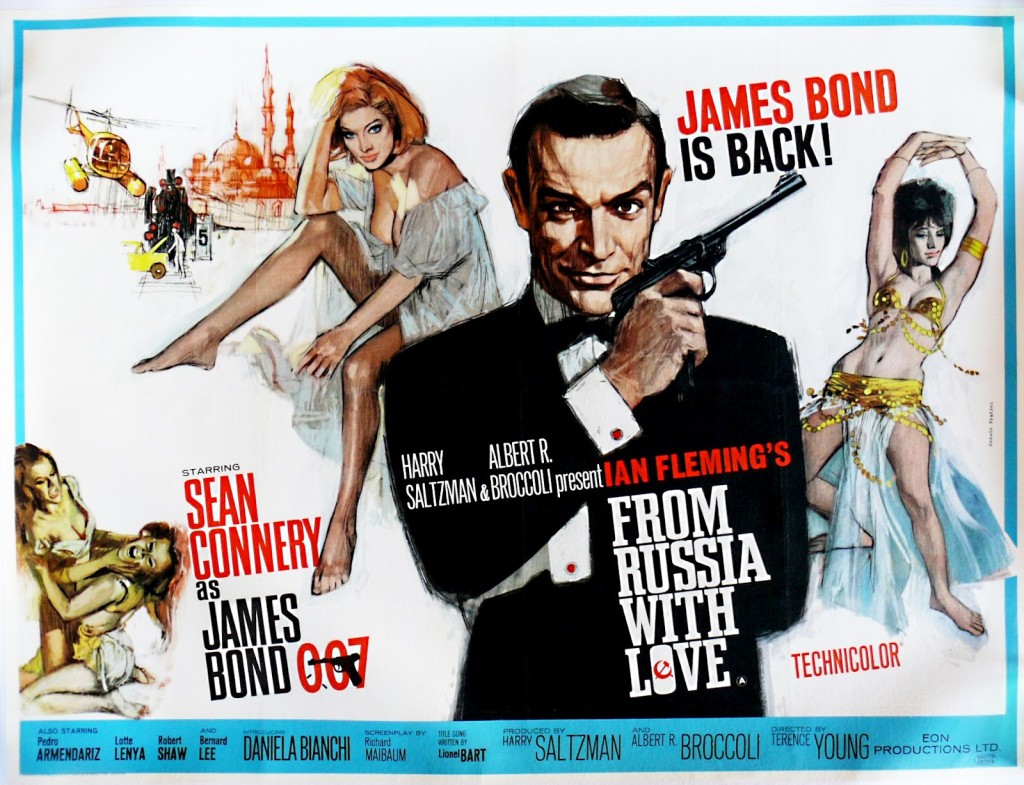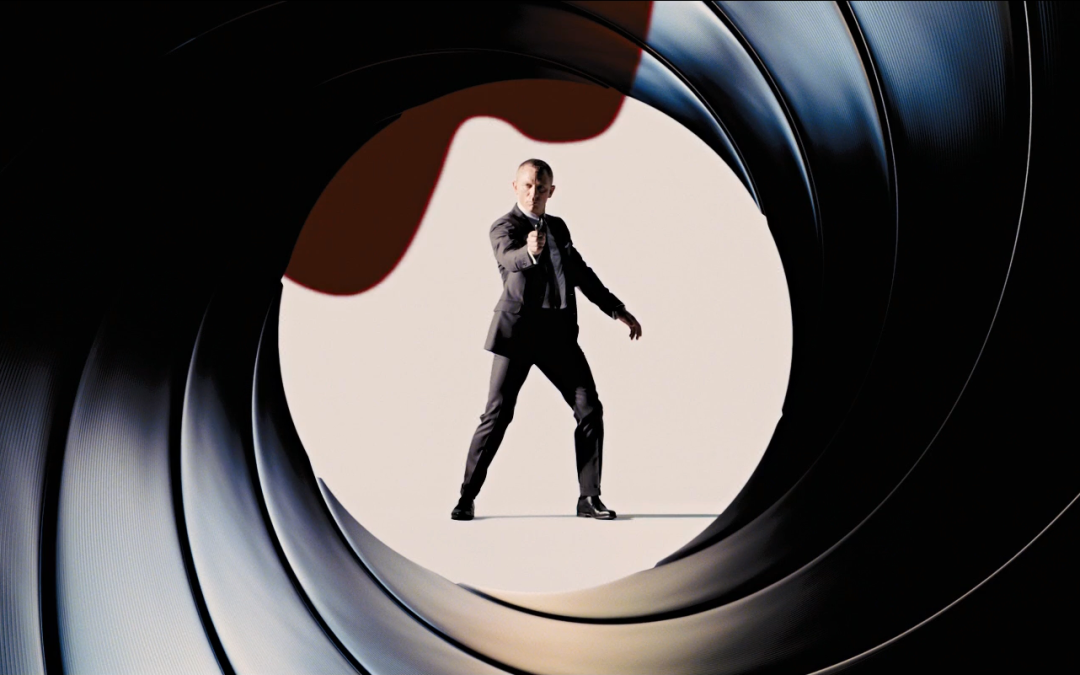
by 007hertzrumble | Jul 9, 2013 | My Favorite #Bond_age_

From Russia With Love: The Master of Suspense and Calculated Visual Pleasure
by James David Patrick (@007hertzrumble)
Hitchcock’s sphere of influence over popular cinema cannot be overestimated. He perfected the psycho-drama, created the slasher and excelled at popcorn action thrillers in addition to technical innovations in camerawork and editing. In fact, his North by Northwest (1959) heavily influenced the direction of Dr. No (1962) and From Russia With Love (1963). EON (Harry Saltzman and Cubby Broccoli) not only tried to hire Cary Grant to play James Bond, but Ian Fleming sent a telegram with the intention of gauging Hitchcock’s interest in directing the first Bond movie (which, at the time of the telegram concerned the script that would eventually become Thunderball). Not that Hitch would have agreed, of course, because as far as I know, he dismissed the enterprise without so much as a conversation. After all, he was more interested in how extraordinary events affected the layman rather than the tales of the world’s most famous agent of espionage.
From our perspective, looking back on 50 years of Bond, the idea that James Bond could even be considered a project for the great and legendary Alfred Hitchcock appears farcical. We’ve seen Bond drive invisible cars, diffuse a bomb dressed as a circus clown, steamroll a henchman with a Zamboni and command a legion of screaming ninjas in a volcano assault (just to name a few isolated events). Despite our collective affection for the Bond franchise, it must be admitted that Bond is Hitchcock material in fanciful theory only. But it wasn’t always that way. Once upon a time, Bond seemed like a logical receptacle for Hitchcock’s talents. (more…)

by 007hertzrumble | Jul 4, 2013 | My Favorite #Bond_age_

The Simplicity of Dr. No
by Eric Jones (@deacon05oc)
Dr. No was not my first James Bond film. As a child growing up in the late 80’s and early 90’s, before the release of GoldenEye, it was actually one of the last movies in the series that I watched. It is however my favorite movie in the franchise. Are there better Bonds? I certainly believe so. Do some of them have better stories, better villains or more in-depth characterization? Absolutely. Dr. No is more known for being a watershed moment in film history than it is, perhaps to say, a watershed film. This is the introduction of Agent 007. And boy is it an introduction.
Dr. No is both a James Bond movie and not at the same time. Being the first big screen version of Ian Fleming’s literary spy, no one knew if this enterprise would be a success or a failure. It certainly has elements of the movies that would follow, the theme, the gun barrel, his briefing with M, flirting with Moneypenny, exotic locations, beautiful women, megalomaniacal villain. But it wasn’t yet meshed together as the formula had yet to be written. For the most part, the movie feels like a two-part episode of Hawaii Five-O set in Jamaica. It sounds as if I am nitpicking, but these are exactly the things that make this movie my personal favorite. (more…)

by 007hertzrumble | Jun 25, 2013 | #Bond_age_ Project, From Russia With Love
This essay on From Russia With Love is the second in a 24-part series about the James Bond cinemas. I encourage everyone to comment and join in on an extended conversation about not only the films themselves, but cinematic trends, political and other external influences on the series’ tone and direction.
Of [In]human #Bond_age_ #2: The Argument for Tatiana Romanova (and From Russia With Love)
by James David Patrick
originally published on Sundog Lit

Departing briefly from the mythology and legend of the James Bond character, let’s adjust our focus to the Bond girls for a moment. I’m thinking specifically about Tatiana Romanova, played in the film From Russia With Love by Italian vixen Daniela Bianchi, and Tatiana’s place in the Bond girl lineup. She doesn’t have the legendary name like Goldfinger’s Pussy Galore or Moonraker’s Dr. Holly Goodhead or a killer swimsuit like Honey Rider in Dr. No, Miss Mary Goodnight in The Man With the Golden Gun or Domino in Thunderball. She also doesn’t cause Bond to change his ways or fall in love or seek revenge (see Teresa De Vicenzo in On Her Majesty’s Secret Service and Vesper Lynd in Casino Royale). As a result she’s never listed at the top of those Bond-girl ranking lists (that actually use more logical computation than the BCS rankings) or defended among friends in a best Bond-girl argument.
Except by me, of course

First some character background. Tatiana Romanova is a corporal in the Soviet Intelligence organization, assigned a job as cipher clerk. She is chosen for the role of seductress by her commanding officer (Rosa Klebb, who, in the film is also an agent for SPECTRE) in a plot to discredit British Intelligence by framing and murdering a culturally significant figure. In this case, the legendary British spy James Bond. Because SPECTRE is purely a cinematic invention, we will not consider the novelization treatments of Tatiana and Klebb for this chat because the SMERSH/SPECTRE differences are not inconsequential. Tatiana believes she is working for the Soviet government and therefore believes she is on the side of greater good, an agent of espionage sent to merely plant false information. She has no knowledge of the murder plot or SPECTRE’s design on her. Tatiana’s pretense for contacting Bond is that she has fallen in love with him through pictures and stories of heroism, wants to abandon the Soviets, and aims to deliver the Soviet code machine, LEKTOR, to British Intelligence as a show of good faith. (more…)

by 007hertzrumble | Jun 20, 2013 | #Bond_age_ Project
This is the intro to a 24-part series about the James Bond cinemas. I encourage everyone to comment and join in on an extended conversation about not only the films themselves, but cinematic trends, political and other external influences on the series’ tone and direction.
Skyfall and the Question of Spacetime: An Of [In]human #Bond_age_ Introduction
by James David Patrick

The Bond film franchise, now aged fifty, has endured long enough to have had the luxury of multiple reinventions and course corrections, informed, directly, by the rapid shifts of the sociological and political tides. Bond is both a reflection of our deepest fears and of our guiltiest aspirations. Women want him and men want to be him, so the saying goes. Or went, perhaps. Our modern cynicism and over-intellectualization has re-rendered that phrase. James Bond has become the man that women want, in theory… if he weren’t such a serial womanizer with a thrill-addiction. He is still, however, the man that men want to be, no caveats. Draw your own assumptions about how the collective male id has evolved over the last fifty years. Bond has become a character in our modern commedia, played by six different actors (all informed by the original on-screen Bond, Sean Connery) and parodied and re-imagined the world over, no more or less human than Pierrot the fool.
Taken at face value, however, James Bond’s cinematic escapades in international espionage are a collection of stories taken from the career of one man. Independent scholars John Griswold and Henry Chancellor have taken it upon themselves to assemble the original Ian Fleming novels into chronological order based on the events contained within. The films, however, prove more problematic. If the latest, excellent entry into Bond’s resume, Skyfall, has cemented one notion about chronology it is that the Bond films cannot be treated as isolated escapades along an individual timeline. Not even suspension of disbelief can atone for Skyfall’s temporal incongruities (even within the movie itself). Must we then consider the Bond series as multiple serials distinguished only by the actor playing the role? (Also made problematic by recurring, self-referential leitmotifs.) Or is it something more complicated, like the intertwining plots of a collection of linked short stories with no particular start or finish? (more…)









